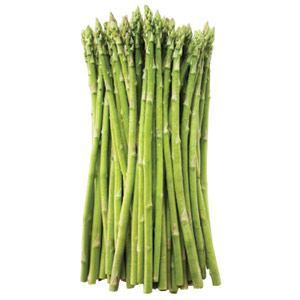Asparagus is obviously a super healthy vegetable, but does that hold true for dogs?
 Here’s the deal:
Here’s the deal:
Pretty much the only downside to giving your dog asparagus is a likelihood of odors, i.e., gas or smelly urine.
Putting that aside…
The nutrients are beneficial for canines too. In fact, asparagus can reduce inflammation and arthritic joint pain which may, at least in theory, help your dog.
But, at the same time, canines aren’t so well equipped to eat lots greens. So be sure to share in moderation.
Your Dog Can Eat Asparagus (small portions)
Though it is entirely possible that your pooch’s stomach won’t agree.
Thankfully, such reactions are rare.
Of course, it isn’t necessary to include asparagus in a typical canine diet.
But, again…
You can offer your dog this wonderful vegetable minus the fern!
Asparagus Fern is Toxic
To be clear, there are several types of asparagus plants which are dangerous according to the ASPCA.
Play it safe. Don’t let your dog play near any asparagus ferns.
The specific toxins are called Sapogenins. They can cause gastric upset (if ingested).
Never fear since asparagus stalks are not poisonous for dogs.
Best Way To Prepare It
Make asparagus easier on doggie digestion by cutting the stalks up into small pieces.
Serve a small portion plain and without any other ingredients.
Avoid garlic and butter.
You can give your dog fresh cut-up stalks (raw) or serve them lightly cooked in boiling water or steamed.
Most of the nutrients will be lost if you are feeding well done asparagus.
Tip: Much like spinach, consume your supply sooner rather than later. Asparagus rapidly loses its nutrients.
Asparagus is a Superfood
This food is extremely wholesome. It’s no wonder you want to share!
Asparagus is low in calories yet it packs an excellent nutritional punch.
For sure dogs can benefit from:
- Vitamin K
- Folate
- Copper
- Iron
- Vitamin B1 & B2
But, more than anything, perhaps the qualities in asparagus that dogs could most utilize are the powerful antioxidants.
Dogs are Mostly Carnivores
Your dog doesn’t need lots of vegetables to supplement their diet (as long as they’re getting quality meat protein).
In addition, not all foods considered healthy for humans will apply to domesticated animals.
That said, there’s nothing wrong with feeding modest portions of plain asparagus.
A 100% strictly carnivorous diet is misguided. Don’t overdo it with veggies!
The Bottom Line
Asparagus is A-OK for dogs.
Serve it lightly cooked or raw. This ensures they’ll get the rich nutrients.
Just don’t be surprised at the terrible smells — either from urine or flatulence.
Start with a small amount, especially when initially feeding your dog asparagus.

I’m happy that it’s okay for my dogs to eat asparagus!
My 15 year old Pug loves all veggies and fruits. At least the ones she’s allowed to eat, especially asparagus. I always joke with the kids and say she should have been a vegetarian because she just loves them so much.
Asparagus are one of very few vegetables that can provide your pet with probiotics. Steam them or puree, add 10% to daily meal. There is nothing better than feeding good wholesome food to your pet as opposed to processed pet food filled with fillers, preservatives and all that other crap.
Dogs are mammals too and they are dying from cancer, diabetes, arthritis, renal failure, etc. The same diseases are killing them as humans. I’m a Detox Certified Coach for humans. When a friend told me her dog was dying from cancer and arthritis I found that similar diets and supplements, in less amounts than humans, are helping them.
We feed our 1 year old Westie with protein-based hard food and we give her dry liver treats. Little by little, I found she likes asparagus. Yes, dogs are carnivores and also they have liver, insulin. They get fat as humans with high simple carbs diet so I’m finding asparagus is a great complex carb complement to their diet after reading how other dogs like it.
I’m saying give it to them once in a while instead of making their whole diet asparagus based, of course. Remember, carnivores need veggies nutrients (vitamins, minerals, etc). They get it when eating meat from herbivores that ate veggies.
I give my little dog about 2 inches of steamed asparagus, sliced in tiny pieces, about once a week. Dogs can eat vegetables and aren’t strictly carnivores. We all know they love to chomp on lawn grass here and there.
Recently, I was looking for a whole food dog treat. A treat that would satisfy my dog and at the same time, contain next to no calories and sugars. I tried asparagus and couldn’t believe what I was seeing. She simply loves it! Now, along with carrots and almonds, it is part of her regular diet. If something doesn’t sit right with a dog’s ability to digest, more than likely, it will not take to the particular food readily, again.
Although I am not a vet, I can say that yes there are certain things that our little doggies cannot have (such as grapes). I believe that our dogs do need some veggies. For example, as a nice treat as opposed to a store bought one (possible preservatives), we have been giving them baby carrots and sometimes asparagus stocks. For years they have been happy with this.
Be a smart pet owner and realize that whatever veggies are in your doggies crunched up food is good enough. Well, I say fresh are better than processed. Just make sure you are giving them the right veggies. Good luck to you!
Absolutely! I agree, whole foods are always a better choice, for us as well. A little heads up on baby carrots: most of those little bags of carrots you see in your grocery store, unless they actually state ‘baby carrots’, are not. As well, because they are peeled, are treated with ammonia to prevent bacteria forming. Go for the large, organic, unpeeled carrots-bagged. A simple slicing in two, or four if they’re large and you have a small dog, will suffice nicely.
I was blanching asparagus tonight and my dog was begging for it. He loves asparagus, green beans, apples, watermelon and cantaloupe. I make chicken, rice, beef and turkey for him too.
Asparagus is great! Though apples must be without skin or seeds. Seeds contain cyanide naturally.